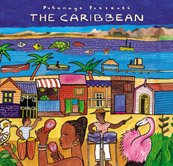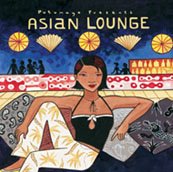Putumayo music has gained a reputation for their socially aware CD’s – not only that most of them give a portion of their proceeds to charity, but that the company tries to seek out artists who will not be familiar to those of us in the North American musical climate. Despite the folk-art covers that are their trademark, the vast majority of their new releases are of music that could top the pop charts in any country, and offer a more realistic glimpse into the music of these countries and continents. This is hardly ethnomusicological exploration, deep insight into the traditional musical culture of these places, but the Putumayo motto of “Guaranteed to Make You Feel Good” definitely fits with all of their albums, which speak perhaps more to the groove than the mind.
Two of the most recent releases from this label are The Caribbean and Asian Lounge.
The Caribbe
 an offers a mix of all the wide variety that this region has to offer: Cuban son, Jamaican reggae, Puerto Rican salsa, Dominican meringue, Haiti’s compass, and others. Music of this area shares an irresistible rhythm that comes from the strong African influence throughout the region. The album leans heavily towards dance styles and tunes. Two styles that were popular throughout the Caribbean are ska - there is a great tune by Cuban artists Ska Cubano dedicated to the santeria goddess Changó – and soca, which blends calypso and east Indian influences, and the band Coalishun from Barbados brings to fruition in their song Thundah. Wether the style is an updated pop-influenced sound like those or the acoustic roots based sound of artists like Stanley Beckford, all of the music is about motion – the motion of styles from Africa and elsewhere to settle in these islands, and the motion that the rhythms inspire. Especially in this cold weather, they make you want to move – both your body and to the warm sands of the islands.
an offers a mix of all the wide variety that this region has to offer: Cuban son, Jamaican reggae, Puerto Rican salsa, Dominican meringue, Haiti’s compass, and others. Music of this area shares an irresistible rhythm that comes from the strong African influence throughout the region. The album leans heavily towards dance styles and tunes. Two styles that were popular throughout the Caribbean are ska - there is a great tune by Cuban artists Ska Cubano dedicated to the santeria goddess Changó – and soca, which blends calypso and east Indian influences, and the band Coalishun from Barbados brings to fruition in their song Thundah. Wether the style is an updated pop-influenced sound like those or the acoustic roots based sound of artists like Stanley Beckford, all of the music is about motion – the motion of styles from Africa and elsewhere to settle in these islands, and the motion that the rhythms inspire. Especially in this cold weather, they make you want to move – both your body and to the warm sands of the islands.Asian Lounge is a totally different kind of album – “a collection of cross-cultural fusions and laid-back beats inspired by the musical traditions of Asia.” To get back to my musica
 l snob mentality, this is an area where I feel I must tread carefully. My professors would tell me that these albums are clear cases of Orientalist practices – creating the exotic “orient” and playing it off of a western standard. I don’t necessarily agree with this, and I don’t want to value one type of album over the other, but I do feel that it’s important to make clear the difference – The Caribbean is a CD that explores the music of a region, Asian Lounge is essentially international music – inspired by musical traditions, but mixed with pop and electronic beats that have their basis in western traditions but are slowly becoming a world spread musical medium. If you are looking for traditional examples of any of these national styles, this is not the place to go, but with that disclaimer in mind, Asian Lounge does offer a wide variety of new and different soundscapes to explore.
l snob mentality, this is an area where I feel I must tread carefully. My professors would tell me that these albums are clear cases of Orientalist practices – creating the exotic “orient” and playing it off of a western standard. I don’t necessarily agree with this, and I don’t want to value one type of album over the other, but I do feel that it’s important to make clear the difference – The Caribbean is a CD that explores the music of a region, Asian Lounge is essentially international music – inspired by musical traditions, but mixed with pop and electronic beats that have their basis in western traditions but are slowly becoming a world spread musical medium. If you are looking for traditional examples of any of these national styles, this is not the place to go, but with that disclaimer in mind, Asian Lounge does offer a wide variety of new and different soundscapes to explore.With internationally mixed music, what immediately comes to mind, and is mentioned in the liner notes, is the influence of Indian music in American pop, starting with the Beatles and Ravi Shankar. There is a considerable proportion of the album devoted to music from these regions, but still a few tracks that stand out as other examples: One by Japanese artists Yoshida Brothers, who have turned the traditional banjo-like shamisen into a source for musical fusion, and another by Bali Lounge, which is an Indonesian project that brings local musicians into the public spotlight by teaming them up with international artists, in this case Nicolas Rastoul, a French musician and producer. It is unfortunate that a greater balance couldn’t be struck, especially with the exclusion of China completely from the album, but there is some attempt made at variety of sound, at least within the narrow spectrum of “lounge”…whatever that means.
Putumayo offers as wide a variety of albums as there are places for them to come from – and their library is well served by these two new additions, sure to please any burgeoning world music fan. Think of them as the cliff notes to global sounds – a primer for what’s out there beyond our billboard top 20.
Also published on http://blogcritics.org/





No comments:
Post a Comment